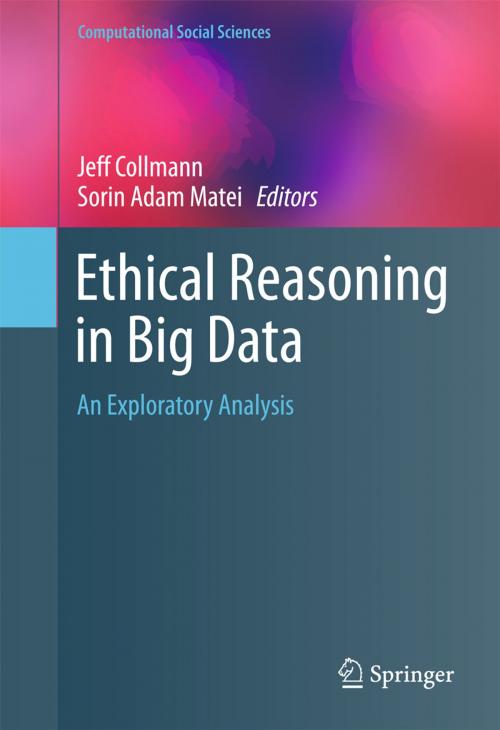Ethical Reasoning in Big Data
An Exploratory Analysis
Nonfiction, Computers, Database Management, Religion & Spirituality, Philosophy, Ethics & Moral Philosophy, General Computing| Author: | ISBN: | 9783319284224 | |
| Publisher: | Springer International Publishing | Publication: | April 22, 2016 |
| Imprint: | Springer | Language: | English |
| Author: | |
| ISBN: | 9783319284224 |
| Publisher: | Springer International Publishing |
| Publication: | April 22, 2016 |
| Imprint: | Springer |
| Language: | English |
This book springs from a multidisciplinary, multi-organizational, and multi-sector conversation about the privacy and ethical implications of research in human affairs using big data. The need to cultivate and enlist the public’s trust in the abilities of particular scientists and scientific institutions constitutes one of this book’s major themes. The advent of the Internet, the mass digitization of research information, and social media brought about, among many other things, the ability to harvest – sometimes implicitly – a wealth of human genomic, biological, behavioral, economic, political, and social data for the purposes of scientific research as well as commerce, government affairs, and social interaction. What type of ethical dilemmas did such changes generate? How should scientists collect, manipulate, and disseminate this information? The effects of this revolution and its ethical implications are wide-ranging. This book includes the opinions of myriad investigators, practitioners, and stakeholders in big data on human beings who also routinely reflect on the privacy and ethical issues of this phenomenon. Dedicated to the practice of ethical reasoning and reflection in action, the book offers a range of observations, lessons learned, reasoning tools, and suggestions for institutional practice to promote responsible big data research on human affairs. It caters to a broad audience of educators, researchers, and practitioners. Educators can use the volume in courses related to big data handling and processing. Researchers can use it for designing new methods of collecting, processing, and disseminating big data, whether in raw form or as analysis results. Lastly, practitioners can use it to steer future tools or procedures for handling big data. As this topic represents an area of great interest that still remains largely undeveloped, this book is sure to attract significant interest by filling an obvious gap in currently available literature.
This book springs from a multidisciplinary, multi-organizational, and multi-sector conversation about the privacy and ethical implications of research in human affairs using big data. The need to cultivate and enlist the public’s trust in the abilities of particular scientists and scientific institutions constitutes one of this book’s major themes. The advent of the Internet, the mass digitization of research information, and social media brought about, among many other things, the ability to harvest – sometimes implicitly – a wealth of human genomic, biological, behavioral, economic, political, and social data for the purposes of scientific research as well as commerce, government affairs, and social interaction. What type of ethical dilemmas did such changes generate? How should scientists collect, manipulate, and disseminate this information? The effects of this revolution and its ethical implications are wide-ranging. This book includes the opinions of myriad investigators, practitioners, and stakeholders in big data on human beings who also routinely reflect on the privacy and ethical issues of this phenomenon. Dedicated to the practice of ethical reasoning and reflection in action, the book offers a range of observations, lessons learned, reasoning tools, and suggestions for institutional practice to promote responsible big data research on human affairs. It caters to a broad audience of educators, researchers, and practitioners. Educators can use the volume in courses related to big data handling and processing. Researchers can use it for designing new methods of collecting, processing, and disseminating big data, whether in raw form or as analysis results. Lastly, practitioners can use it to steer future tools or procedures for handling big data. As this topic represents an area of great interest that still remains largely undeveloped, this book is sure to attract significant interest by filling an obvious gap in currently available literature.















